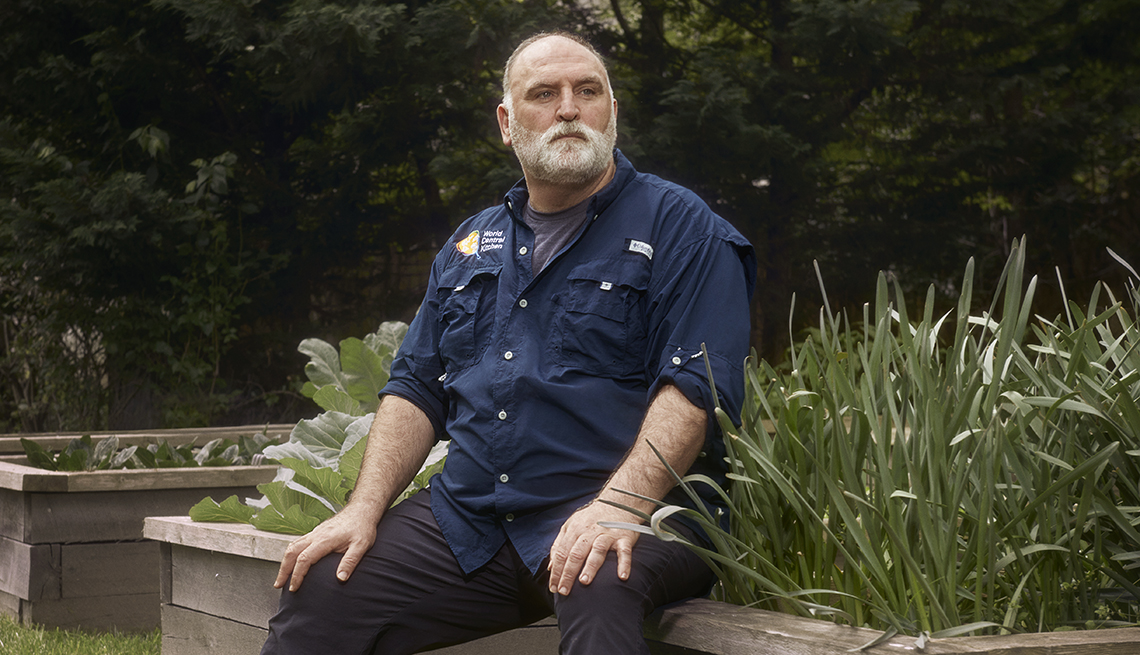
Jose andres is feeding those in need around the world
- Select a language for the TTS:
- UK English Female
- UK English Male
- US English Female
- US English Male
- Australian Female
- Australian Male
- Language selected: (auto detect) - EN
Play all audios:

Food, family, caregiving and community are tightly interconnected in Hispanic cultures. I suggest to Andrés that these cultures also teach responsibility for parents and grandparents, and he
agrees. “Family is a very important part of who we are,” he says. “Nuestras abuelas, nuestros abuelitos ['Our grandmothers, our grandfathers'] — there's a big respect in
that. But I sense that in many American communities, like in the Navajo Nation, the elders are loved and protected as well. I think that's something we need to keep on embracing. Like
my friend [hunger activist] Robert Egger always says, ‘Wrinkled people and wrinkled food,’ right?” By “wrinkled food,” Andrés means produce that seems past its prime. “It doesn't look
picture-perfect,” he explains. “But sometimes it's the most delicious food, because it's ripe.” He pronounces this word in a way you can almost taste, conveying lusciousness. “I
think that Hispanic people, we understand that. We need to make sure we understand that wrinkled people and wrinkled food are beautiful.” Andrés has been married since 1995 to Patricia
Fernandez de la Cruz, with whom he lives in Bethesda, Maryland. The two have three young-adult daughters: Carlota, Ines and Lucia. In interviews, José and Patricia tease each other
good-naturedly, as long-married couples often do. When _Bethesda magazine_ asked him how long he and his wife had dated, he said, “We are still dating.” The age of 50, he says, is when he
began to feel his mortality: “I've covered half of my life! But this is clear to me — that you learn that you know nothing as you grow older. You are only wiser when you know how much
more you have to learn.” He laughs. “And then … the clock is ticking!" "I see my daughters more and more like my friends, as they grow older and I grow older, and that's a
good feeling,” he adds. “The beauty of families is that they will be celebrating when you do good and they will be supporting you even more when you don't. And they don't need to
be blood family, because with some people, the connection is so strong that they're the people that you know you will count on.” RESPONDING TO THE PANDEMIC In response to the COVID-19
pandemic, World Central Kitchen is providing more than 300,000 meals per day to people in need throughout the U.S. Those over 50, who've been the hardest hit by the coronavirus, have
been a big part of the organization's overall outreach. “Some of the first places where we began were homes for the elderly, from Washington, D.C., to New Orleans to Chicago,” Andrés
says. He points out that older people living independently may not have family members nearby, so the hardships they face may not be only financial ones. "We're partnering with
AARP, which provides solutions for programs like SNAP [the Supplemental Nutrition Assistance Program] and the other forms of food aid used by seniors,” Andrés says. “These programs are
digital so that the elderly can order online and receive their meals at home.” (AARP is currently helping World Central Kitchen provide meals for older people in Washington, D.C.; the Bronx,
New York; and Oakland, California.) In addition to offering direct relief, World Central Kitchen has responded to the pandemic by focusing on developing a rescue plan for the beleaguered
restaurant industry. In tandem with a group of lawmakers, Andrés helped craft a bill designed to simultaneously feed people and save restaurants. The FEMA Empowering Essential Deliveries
(FEED) Act would authorize the federal government to pay 100 percent of the cost for state and local governments to partner with restaurants to serve food to those in need, as well as
support businesses and farmers fighting to survive the pandemic. Major provisions of the FEED Act were included in the HEROES Act coronavirus relief bill, which had passed the House of
Representatives and had been sent to the Senate. This approach reflects the difficulties World Central Kitchen encountered in trying to feed the Puerto Rican victims of Hurricane Maria in
2017. Andrés’ memoir, _We Fed an Island_, is largely concerned with institutional and governmental failures and how to address them — moving aside the bureaucratic obstacles facing those who
are coordinating large-scale relief efforts. He says nothing has changed since the book was published. "The perception is that FEMA [the Federal Emergency Management Agency] is in
charge of coming up with smart solutions to feed people in emergencies. I understand; they need to be a contract agency.... We are not supposed to be leading, but sometimes we are the de
facto leading agency. In the Bahamas, we evacuated, with our helicopters, 40 or 50 people, almost all of them seniors. We are cooks, and we're the ones evacuating the elderly to the
hospitals?” He laughs. “I'm very proud we did it, but I'm also very upset. Because had we not been there, who was supposed to be there?" "So how will it be possible,” I
ask, “to get the biggest institutions and governments to embrace these ideas?” He says he is very hopeful about the FEED Act. But more is needed. “There's no reason why a school lunch
program shouldn't be a way to feed not only children but families,” Andrés points out. “There's no reason why restaurants that were closed in the middle of a pandemic emergency
shouldn't be feeding the local populations. There's no reason why we should be throwing away food as garbage at farms and have farmers losing their livelihoods at the same time
that we have long lines and people going hungry in other parts of the country.”
